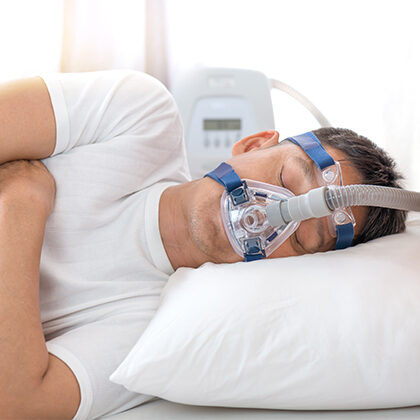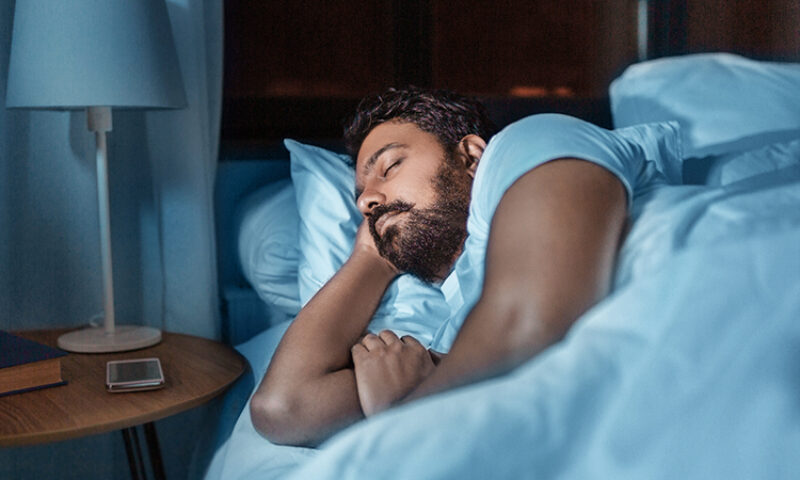
Sleep Apnea
Excessive snoring, feeling tired all the time, and lack of focus are all symptoms of sleep apnea.
What is sleep apnea?
Sleep apnea is a condition where a person experiences repeated stopping and starting of breathing during sleep. This causes an individual to sleep poorly, snore loudly, and even affects the flow of oxygen into the bloodstream which can have further complications. It is a condition that affects both men and women and is one of the more commonly known sleep disorders. Both children and adults can experience sleep apnea so understanding the signs and treatment options is critical for ensuring a good night's sleep.
Signs of Sleep Apnea
A sleep medicine provider will look at a variety of signs and related conditions to make a diagnoses. Sleep apnea is most often characterized by snoring. However, there is a wide variety of symptoms associated with this condition.
Snoring loudly
Gasping for air during sleep
Breathing pauses during sleep, which may be observed by someone else
Waking up with a dry mouth or headaches
Insomnia or difficulty staying asleep
Excessive daytime sleepiness
Trouble concentrating during waking hours
Mood changes such as irritability
What causes sleep apnea?
There are a variety of causes of sleep apnea depending on the type an individual has. Sleep apnea can be broken into two main types, each with its own root causes: obstructive and central.
Obstructive Sleep Apnea
The more common of the two types, obstructive sleep apnea occurs when the airway is blocked, likely due to relaxation of the throat muscles. This narrows the airway causing difficulty breathing resulting in lower than normal oxygen levels in the blood. When levels get too low, the individual may awaken, even for a brief moment, to reopen the airway.
Those with obstructive sleep apnea may snore excessively, stop breathing entirely, and choke or gasp. This cycle occurs over and over throughout the night resulting in difficulties getting a restful night of sleep.
There are several causes of obstructive sleep apnea including:
Being overweight
Being male as men are more likely than women to suffer from this type of sleep apnea.
Family history
Lifestyle factors including smoking, alcohol use, drug abuse
Having a related medical condition such as high blood pressure and Type 2 diabetes.
Central Sleep Apnea
This type of sleep apnea occurs when the brain fails to signal for the individual to breath. This results in frequent periods throughout the night that little to no breathing is occurring. Those afflicted with this type of sleep apnea may report feeling out of breath after sleeping or have symptoms of insomnia.
Causes of central sleep apnea include:
Age - older people being at higher risk.
Being male - men are at higher risk
Medical conditions such as heart disease or previously having a stroke.
Narcotic usage (either prescribed or not)

Sleep Studies to Diagnose Sleep Apnea
It’s important to properly diagnose sleep apnea to determine the type and the best treatment course of action. Sleep apnea can be difficult to diagnose so it is important to partner with a sleep medicine provider to begin documenting a sleep history.
Sleep testing at Schneck Sleep Center
Schneck medical center is proud to offer a state of the art sleep testing center. At the center, patients will spend the night and have their sleep monitored. We provide a relaxing, comfortable environment to ensure the best sleep possible and the most accurate test results. Providers often recommend this type of sleep testing if they believe central sleep apnea is likely.
At home sleep study
Similar to a test at the sleep center, Schneck is proud to offer at home sleep testing. This is the recommended type of sleep study for obstructive sleep apnea and may be recommended by a provider depending on initial signs and conditions. Patients will be sent home with the equipment needed to perform the study. A provider may not recommend an at home sleep study because it is limited in the number of sensors due to the at home equipment and is not accepted by all insurances.
How is sleep apnea treated?
Depending on the type of sleep apnea, severity, and associated symptoms, a provider may recommend one of the following treatment options. individual
Continuous positive airway pressure (CPAP)
A continuous positive airway pressure or CPAP machine provides a steady amount of air to keep the airway open. The type of machine varies but it can include a mask that covers the individual's mouth, nose or both. Some find the machine uncomfortable to sleep with, however there are a variety of different types and adjustment settings that can be customized.
Oral Appliance
A number of oral appliances may also be available to use. They are designed to keep the throat open but are often not as effective as a CPAP machine. It’s always recommended to work with your medical provider to understand the best treatment option possible.
Lifestyle changes
Obesity is a primary condition related to sleep apnea. Some individuals are able to treat their sleep apnea by losing weight and maintaining a healthier lifestyle.
Take the next step toward better sleep
Schneck Sleep Medicine helps individuals understand what is causing their sleep apnea and find solutions that help them get back to better sleep. If you or a loved one is suffering from symptoms associated with sleep apnea, know that Schneck can help. Give us a call to get started.
Call: 812-523-5802
